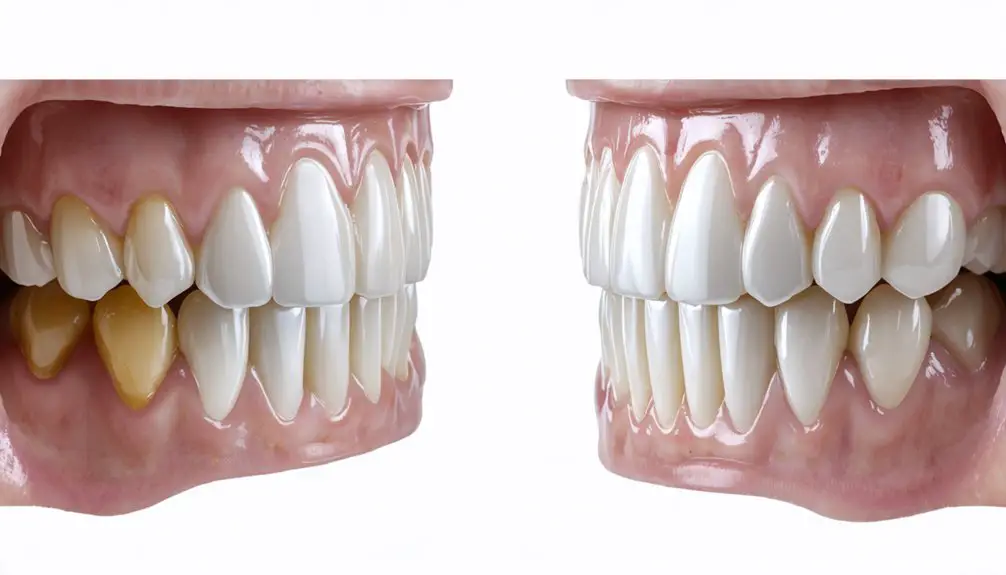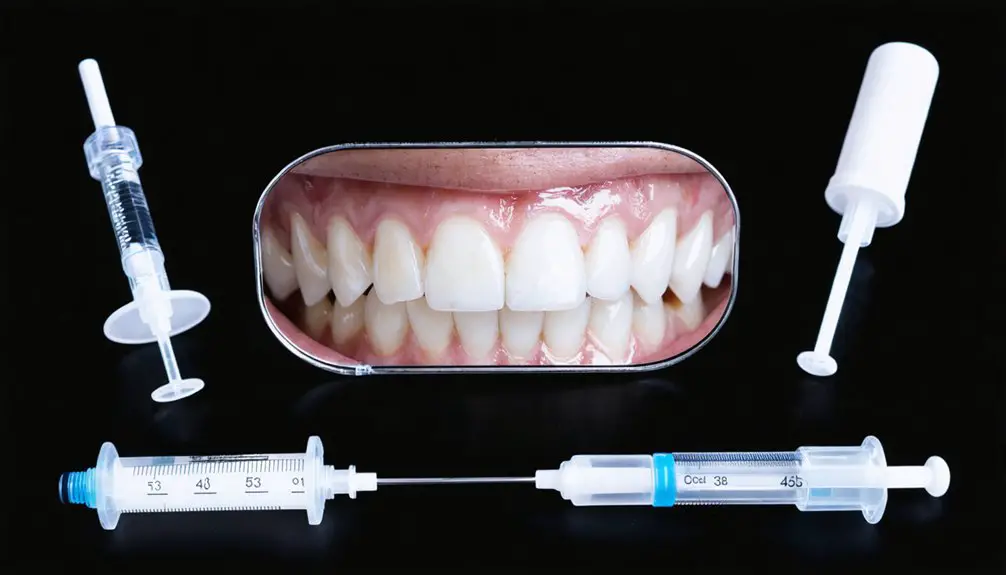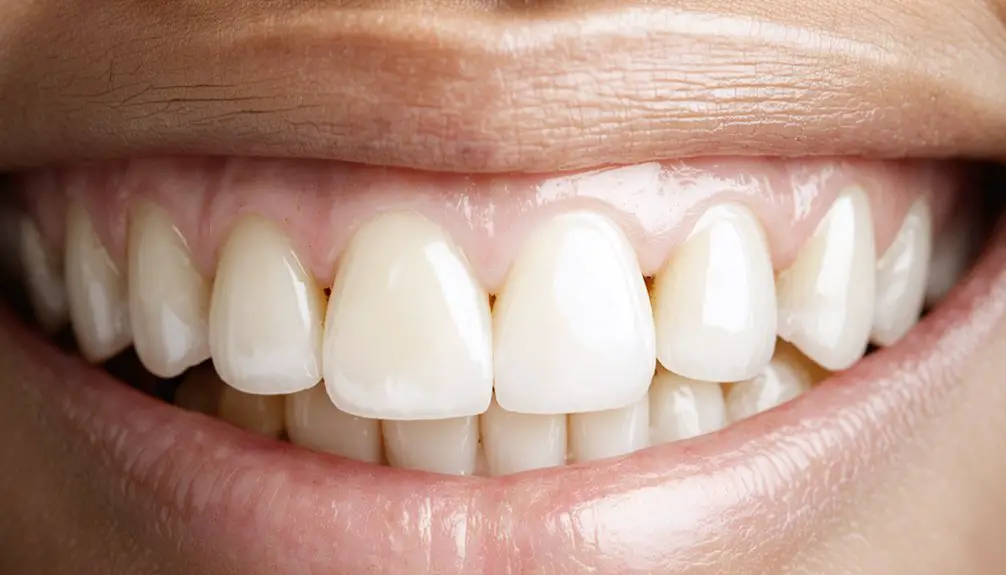You’ll find three main teeth whitening options at distinctly different price points: in-office professional treatments ($300-$1,000 per session), professional take-home kits ($100-$600), and over-the-counter products ($10-$60). While in-office treatments offer immediate results under dental supervision, take-home kits provide professional-grade outcomes at a lower cost. OTC options work well for mild staining but require frequent repurchasing. Your ideal choice depends on your budget, timeline, and whitening goals.
Key Takeaways
- In-office professional whitening costs $300-$1,000 per session, with LED treatments averaging $500 and laser treatments reaching up to $1,500.
- At-home professional kits range from $100-$600, including custom trays and professional-grade bleaching agents lasting 4-6 months.
- Over-the-counter options cost $10-$60, offering budget-friendly alternatives suitable for mild staining and maintenance.
- Geographic location impacts pricing, with urban and coastal areas typically charging more due to higher operational costs.
- Initial teeth condition and required treatment complexity determine total cost, potentially requiring multiple sessions for severe discoloration.
Understanding In-Office Professional Whitening Costs
When considering professional teeth whitening, it’s essential to understand the significant cost variations for in-office treatments, which typically range from $300 to $1,000 per session in the United States.
The price you’ll pay depends on several key factors, including the specific whitening method and your location. Most dental insurance plans consider whitening a cosmetic procedure only.
LED-activated treatments like Philips Zoom average around $500 per session, while laser whitening costs between $400 and $1,500 due to its enhanced treatment effectiveness and faster results.
You’ll find higher prices in urban and coastal areas, where operational costs tend to be greater. Your dentist’s experience level and reputation can also influence pricing. The confidence-boosting effects of these treatments provide patients with invaluable benefits that extend beyond the cosmetic results.
While most sessions last 60 to 90 minutes and can lighten teeth by 5 to 8 shades, severe discoloration may require multiple sessions, increasing your total investment.
At-Home Professional Kits: Pricing and Value
Professional at-home teeth whitening kits offer a cost-effective alternative to in-office treatments, with prices ranging from $100 to $600. These kits include custom trays and professional-grade bleaching agents that provide superior results compared to over-the-counter options. For perspective, in-office bleaching costs typically range from $500 to $1,000. The flexible scheduling options make these kits particularly appealing for busy individuals.
You’ll find that professional take-home kits strike a prime balance between effectiveness and affordability. While treatment takes 10-14 days, the results typically last 4-6 months.
Custom-fitted trays guarantee even application and minimize gum irritation, though you’ll need to follow instructions carefully to avoid sensitivity.
When considering value, these kits deliver more consistent whitening than repeated purchases of OTC products. While they require a higher initial investment, the professional-grade materials and customized fit make them a practical choice for achieving lasting results at home.
Over-the-Counter Options: Budget-Friendly Alternatives
Over-the-counter teeth whitening products offer a budget-conscious entry point into dental brightening, with prices ranging from $10 to $60+ per treatment.
You’ll find various options, including strips containing 3-10% hydrogen peroxide, whitening wraps, and combination kits with LED lights. Professional treatments use higher peroxide concentrations for faster results.
While OTC effectiveness varies by product type, strips like Crest 3D Whitestrips can achieve approximately 2.6 shade improvements over a 19-day whitening duration.
Clinical studies show Crest 3D Whitestrips deliver noticeable results, brightening teeth by over 2.5 shades within three weeks of regular use.
For ideal results, consider products that maintain longer contact with teeth, such as strips or trays, rather than pens or rinses. The Good Housekeeping Institute tested multiple products with 150 consumers to identify the most effective options.
Though these products contain lower peroxide concentrations than professional treatments, they’re suitable for mild staining and maintenance.
Remember that you may need frequent repurchasing due to gradual results, potentially affecting long-term cost savings compared to professional alternatives.
What Determines Your Whitening Treatment Cost
Several key factors influence the cost of teeth whitening treatments, from the specific procedure type to your geographic location and dental provider.
Your choice of treatment options greatly impacts pricing, with in-office procedures ranging from $500-$1,000, while take-home kits cost $300-$500.
Location plays a vital role in pricing factors, as urban practices typically charge more than rural offices due to higher operational costs.
Your teeth’s initial condition and required treatment complexity will determine the number of sessions needed.
Additionally, your dentist’s expertise level affects pricing – specialists and experienced cosmetic dentists often command higher fees.
Regular maintenance visits may be necessary to preserve your whitening results over time.
If you’re considering professional whitening, you’ll need to account for potential pre-treatment procedures and whether you’ll require multiple sessions for best results.
Many dental practices offer payment plans to help patients manage the cost of their whitening treatments over time.
Long-Term Investment: Results and Maintenance Expenses
When considering the long-term value of teeth whitening treatments, it’s vital to understand that results typically last between 6 months to 2 years, with maintenance costs extending beyond the initial investment. Your whitening duration depends heavily on lifestyle factors, including oral hygiene, diet, and smoking habits. Even after this period, tooth shade remains lighter than the original color before treatment.
Modern whitening systems demonstrate a 90% success rate for patients seeking brighter smiles. To maximize your investment, you’ll need regular maintenance sessions every 6-12 months. Combined protocols, involving professional treatments plus monthly home care, provide the most sustainable results.
While maintenance products like custom trays and touch-up gels represent ongoing expenses, they’re important for preserving your bright smile. Professional oversight guarantees safe, effective maintenance that protects your enamel while extending the life of your whitening results.
Frequently Asked Questions
Can Teeth Whitening Damage Existing Dental Work Like Crowns or Veneers?
Your teeth whitening treatment won’t damage dental restorations like crowns or veneers, though you’ll need to take into account that these won’t whiten along with natural teeth, potentially requiring replacement to maintain aesthetics.
Is Professional Teeth Whitening Safe During Pregnancy or While Breastfeeding?
For pregnancy safety, you shouldn’t undergo teeth whitening due to uncertain risks to fetal development. While breastfeeding considerations are less concerning, it’s best to wait until after both periods conclude.
What Age Is Appropriate to Start Professional Teeth Whitening Treatments?
While you might want whiter teeth sooner, wait until you’re at least 18 when your enamel maturity is complete. Teenage candidates should avoid treatment before 14, as younger teeth are vulnerable to damage.
How Soon After a Dental Cleaning Should I Schedule Teeth Whitening?
You can schedule teeth whitening immediately after your dental cleaning for ideal timing. Most dentists recommend same-day treatment since your teeth are free of plaque, maximizing the whitening’s effectiveness.
Can Certain Medications Affect the Success of Teeth Whitening Procedures?
Yes, several medications can greatly impact whitening effectiveness, particularly antibiotics like tetracycline and minocycline, which cause intrinsic staining. You’ll need to discuss medication interactions with your dentist before treatment.
References
- https://www.bruinsdentist.com/understanding-how-much-to-whiten-teeth-a-complete-price-breakdown
- https://www.soladentalspa.com/blog/how-much-does-professional-teeth-whitening-cost
- https://www.gentledental.com/resources/articles/teeth-whitening-cost
- https://www.carecredit.com/well-u/health-wellness/teeth-whitening-costs/
- https://www.smileworksnyc.com/how-much-is-teeth-whitening-in-nyc/
- https://southwestdentalfw.com/professional-whitening-cost/
- https://www.gentlecaredentistry.org/blog/how-much-does-teeth-whitening-cost/
- https://blyssdental.com/teeth-whitening-cost/
- https://www.tualatinvalleydental.com/post/professional-teeth-whitening-vs-at-home-kits
- https://www.smileslosgatos.com/articles/professional-teeth-whitening-vs-at-home-kits



